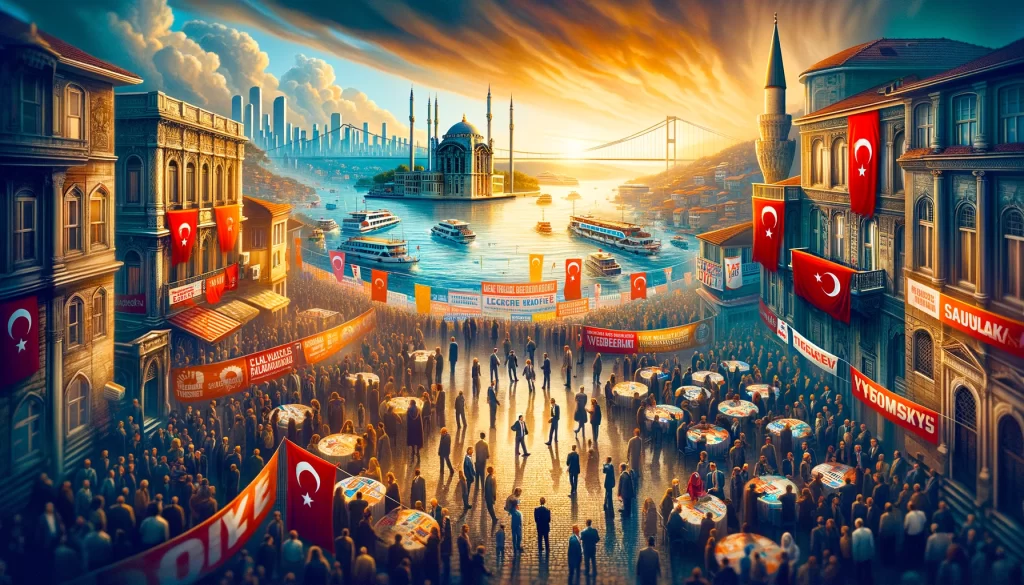The Political Landscape of Turkey
In May of last year, President Recep Tayyip Erdogan of Turkey achieved a significant victory, securing another term and solidifying his influence over the nation. This outcome was a disappointment for many who oppose Erdogan, sparking concerns about Turkey’s future direction toward more centralized power.
However, a shift occurred during the local elections on Sunday, marking a moment of resurgence for Erdogan’s opponents. They managed to secure victories across the nation, taking control of several cities and major metropolises. This change is not just about winning seats but also represents a potential shift in Turkey’s political dynamics, challenging Erdogan’s dominance.
The Significance of Local Elections
The local elections were a critical moment for Erdogan’s political opponents. The Republican People’s Party (CHP), the main opposition, achieved its highest vote percentage, 37.8 percent, since 1977. This was a setback for Erdogan, whose Justice and Development Party (AK Party) saw its worst local election performance in over two decades, winning only 35.5 percent of the vote.
These elections were a clear message from the citizens, expressing dissatisfaction with Erdogan’s handling of the economy. Despite Erdogan’s significant influence in Turkey, bolstered by his efforts to increase the role of Islam in public life and elevate Turkey’s international stature, criticisms have been loud about his governance style, accusing him of moving the country towards autocratic rule.
Economic Crisis and Voter Sentiment
A major factor influencing the election outcomes was the economic situation. Turkey has been grappling with a cost of living crisis, leading to a weakened national currency and high inflation, severely affecting people’s earnings and savings. Erdogan’s economic policies – for example, his insistence on lowering interest rates even when inflation was soaring above 80 percent in late 2022 – have been controversial and seen by many as exacerbating the crisis.

The economic struggles have caused disillusionment among Erdogan’s supporters, leading to a decrease in voter turnout and contributing to the opposition’s success.
The Opposition’s Victory and Its Implications
The victories of the opposition could signify a turning point in Turkish politics. By controlling major cities, opposition leaders can now use these platforms to build their profiles and influence ahead of the next presidential elections. This situation presents a challenge to Erdogan’s power and opens up possibilities for political change in Turkey.
The opposition’s win in cities like Istanbul and Ankara was particularly symbolic. Istanbul, Erdogan’s hometown and a key political battleground, saw its mayor, Ekrem Imamoglu, secure a notable victory against a candidate supported by Erdogan. This win could position Imamoglu as a significant figure in Turkish politics, potentially even a future presidential contender.
Looking Ahead: Turkey’s Political Future
Erdogan’s acknowledgment of the election results as a “turning point” suggests a period of reflection and potential change in strategies for his party. Meanwhile, the opposition’s success has injected new energy into Erdogan’s critics, who see an opportunity to advocate for change and challenge his leadership.
The future of Turkish politics remains uncertain. With Erdogan’s current term extending until 2028 and discussions about the possibility of him seeking ways to maintain power beyond this period, the political landscape is in a state of flux. The opposition’s recent victories could lead to calls for early elections, capitalizing on the momentum to challenge Erdogan’s rule.
This article is based on the following article:https://www.nytimes.com/2024/04/01/world/middleeast/turkey-election-results.html#:~:text=This%20weekend%2C%20the%20opposition%20struck,most%20of%20the%20major%20metropolises.

Background Information
By understanding these elements, readers can better grasp the complexities of the events described in the article and the significance of the local elections in Turkey. This background information provides a foundation for analyzing the political shifts and economic challenges that Turkey faces.
Understanding Turkey: A Crossroads of Continents
Turkey is a unique country that straddles two continents: Europe and Asia. This geographical position has made it a significant player in both regional and global politics. Its capital is Ankara, and Istanbul, its largest city, has been historically significant as a cultural and economic hub.
Political System in Turkey
Turkey is a republic with a democratic government structure, which means that its leaders are elected by the people. The President of Turkey is the head of state and has a significant influence on the country’s governance. The country also has a Grand National Assembly, a unicameral parliament responsible for making laws.
Who is Recep Tayyip Erdogan?
Recep Tayyip Erdogan has been a dominant figure in Turkish politics for over two decades. Initially serving as Prime Minister, Erdogan later became President. His leadership has been marked by significant economic growth and efforts to increase Turkey’s geopolitical influence. However, his tenure has also seen controversies, particularly around issues of press freedom, judicial independence, and the concentration of power in the presidency.
Economic Context: The Importance of the Economy in Politics
The economy plays a crucial role in politics because it directly affects people’s lives – their ability to afford basic needs, the stability of their jobs, and their future prospects. In Turkey, economic issues have been at the forefront, especially with the cost of living crisis, inflation, and currency devaluation. These issues often influence how people vote in elections.
Local Elections and Their Importance
Local elections might seem less significant than national ones, but they have a profound impact on daily life. Local governments are responsible for many services, from education and public transportation to waste management and city planning. Winning control over major cities can provide a political party with a platform to implement its policies and showcase its governance style to the electorate.
The Role of Opposition in a Democracy
Opposition parties play a critical role in a democracy. They challenge the ruling party’s policies, offer alternatives, and hold the government accountable for its actions. A strong opposition is essential for a healthy democracy because it ensures that different voices and perspectives are represented in the political process.
Why Are Economic Policies Controversial?
Economic policies can be controversial because they have different impacts on various groups within society. For example, lowering interest rates can stimulate economic growth by making borrowing cheaper, but it can also lead to higher inflation, which reduces the value of people’s savings and income. Balancing these outcomes is a challenge for any government.
Turkey’s Place in the World
Turkey is a member of various international organizations, including NATO (North Atlantic Treaty Organization). Its geopolitical strategies and policies, especially under Erdogan, have sometimes caused tensions with other countries, including the United States. Yet, Turkey’s strategic location and its role as a bridge between East and West make it a key player on the global stage.

Debate/Essay Questions
- Is a Strong Opposition Necessary for a Healthy Democracy?
- What role do urban centers play in shaping national politics in countries like Turkey?
Please subscribe to Insight Fortnight, our biweekly newsletter!
